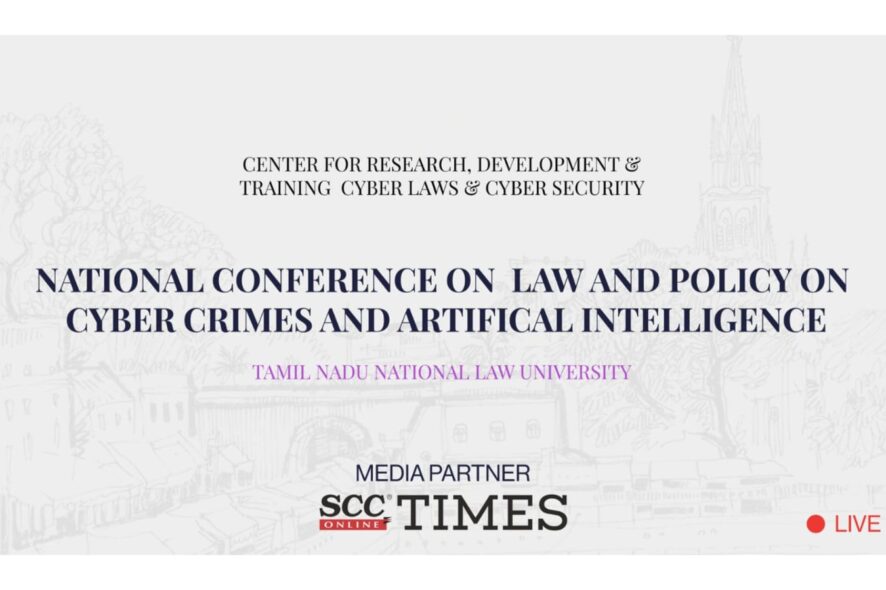Welcome to the Temple City of Tamil Nadu, Tiruchirappalli!
The Centre for Research, Development, and Training in Cyber Laws and Cyber Security at Tamil Nadu National Law University, Tiruchirappalli, is organizing a one-day National Conference on the theme ‘Cyber Crimes and Artificial Intelligence’. SCC Times is the Media Partner for the Conference.
The rapid advancements in Artificial Intelligence (AI) have significantly increased its potential role in facilitating cyber crimes. As AI technology evolves, policymakers must devise proactive strategies to prevent cyber crimes during this critical developmental phase. Equally important is raising awareness and sensitizing the public to the potential risks of using AI in cybercrime.
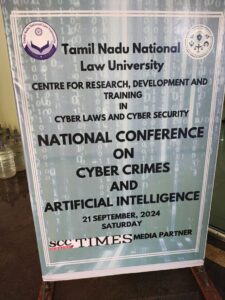
The conference seeks to foster discussion and generate insights on these pressing issues. It will serve as a platform for academic discourse on the regulation of AI, featuring paper presentations and a panel discussion with eminent scholars and experts in the fields of cybercrime and artificial intelligence.
9:00 AM | Registration | Multi-Purpose Hall
The event began with great enthusiasm, marked by the arrival of both paper presenters and panelists. The atmosphere was filled with anticipation as attendees eagerly looked forward to insightful discussions and a valuable learning experience. With a diverse lineup of experts and scholars, the event promises to provide thought-provoking presentations, engaging debates, and opportunities for meaningful intellectual exchange. Everyone is excited to gain fresh perspectives and deepen their understanding of the topics at hand.
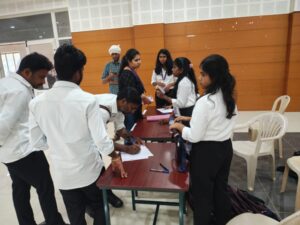
9:30 AM | Inauguration Ceremony| Multi-Purpose Hall
The conference commenced with the Thamizh Thaai Vazhthu, a traditional Tamil anthem, beautifully performed by the Music Club of TNNLU. Following this soulful rendition, the ceremonial Lighting of the Lamp was conducted by the esteemed dignitaries present on stage. This symbolic act, representing the dispelling of darkness and the ushering in of knowledge and enlightenment, set a dignified and auspicious tone for the event.
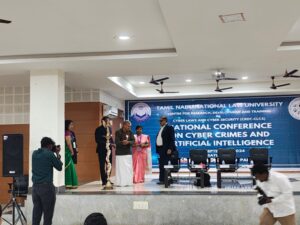
The Welcome Address was delivered by Ms. Vedavalli, Assistant Professor of Law, setting the tone for the conference. Following this, the felicitation of the chief guest, Hon’ble Thiru Justice G.R. Swaminathan, Judge of the Madras High Court, was carried out by Prof. (Dr.) V. Nagraj, Vice-Chancellor of TNNLU, and Prof. (Dr.) S.M. Balakrishnan, Registrar of TNNLU. The ceremony highlighted the presence of distinguished individuals, further elevating the importance of the event.
After the felicitation, the Registrar, Prof. (Dr.) S.M. Balakrishnan, delivered the Presidential Address. He spoke about the pressing issues the conference aims to address, particularly in the areas of cybercrime and data protection. He emphasized the critical need for global cooperation to ensure that cyberspace remains secure. Prof. Balakrishnan expressed his satisfaction at the assembly of esteemed experts and thought leaders who had come together to discuss the challenges of cybercrime and its impact on creating a more peaceful society.
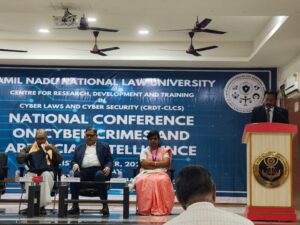
The Introduction to the Theme of the Conference and the Panel Discussion was provided by Ms. Deepa Manickam, Director of the Conference and Assistant Professor of Law. She outlined the objectives of the conference, which aimed to explore the emerging “gray areas” in the realm of cyber law and technology.
Ms. Manickam elaborated on how Indian citizens have transitioned from netizens to a more complex digital identity, often referred to as “cyber-organisms” or “cyberorgs.” She illustrated this transformation by giving examples, such as Sophia the Robot and instances where individuals in Japan have even married holograms, representing the rise of dimensional marriages. She also introduced emerging concepts like digisexuals, demonstrating how technology has reshaped personal and social identities.
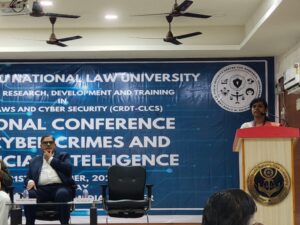
She highlighted the unique sub-themes of the conference, such as cyber hygiene, which focused on the importance of maintaining digital cleanliness and awareness. She underscored the necessity of addressing the legal and ethical gray areas emerging from these developments.
The Panel Discussion is going to be centered on key issues, including jurisdictional challenges in cyberspace, the spread of misinformation, and political theories surrounding digital governance. There will also be a significant focus on India’s proposed Digital India Act, with the afternoon session dedicated to examining data privacy and cyber threats in the age of AI. The panel will also explore the implications of the Data Protection and Digital Privacy Act (DPDP) and the landmark Justice Puttaswamy judgment on privacy, laying the foundation for an insightful and thought-provoking dialogue.
10:00 AM | Inauguration Address| Multi-Purpose Hall
Hon’ble Thiru Justice G.R. Swaminathan, Judge of the Madras High Court, delivered an insightful address, emphasizing the importance of embracing technology in today’s world. He noted that individuals don’t need incentives based on self-interest to adopt technological advancements; instead, the desire to learn and grow should drive this transition. He shared his reflections, stating that, at times, he found himself oscillating between different perspectives, but through consistent learning, particularly by attending conferences like this one, he was able to enhance his understanding and adapt to change.
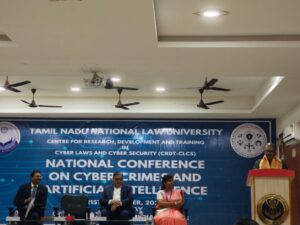
Justice Swaminathan underscored the value of programs like this conference, emphasizing how listening and learning from others can significantly contribute to personal and professional growth. He briefly shared aspects of his legal journey, highlighting how technology has dramatically changed the practice of law. With just a click of a mouse, legal professionals can now access relevant propositions and information—a remarkable shift from the time-consuming processes of the past.
To illustrate the impact of technological advancements, he provided an example from motor vehicle cases, explaining how such cases often took years to resolve. He suggested that by leveraging technology, including AI, these delays could be significantly reduced, making the justice system more efficient and responsive. Justice Swaminathan also emphasized that, in the coming days, the legal profession and society at large will witness immense changes driven by technological innovations.
In conclusion, he urged all attendees to remain attentive and make the most of the conference, stating that the knowledge and insights shared would be immensely valuable to everyone present.
10:15 AM | Release of Handbook | Multi-Purpose Hall
The release of the handbook was conducted by Ms. Deepa Manickam, Director of the Conference. During the release, she provided a detailed account of the inception and purpose behind the Centre for Research, Development, and Training in Cyber Laws and Cyber Security (CRDT-CLCS). Established in 2022, with funding from the Tamil Nadu Government, the Centre was founded with a clear mission: to raise awareness, conduct research, and provide specialized training in the areas of cybercrime, cyber contraventions, and cyber security. The Centre’s primary focus is on educating Internet users, particularly within the State of Tamil Nadu, to prevent cybercrimes, curb the misuse of technology, and strengthen the enforcement of cyber laws.
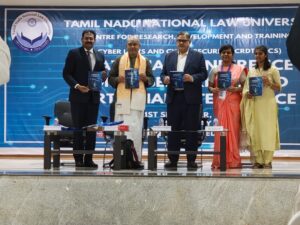
Ms. Deepa elaborated on the process behind the creation of the handbook, which is built upon the foundational principles of cyber law, with a strong emphasis on combating cybercrime. The handbook includes critical chapters on cyber threats, offering practical insights and guidance to both- legal professionals and general Internet users. She expressed her gratitude to everyone who contributed to the project, particularly acknowledging Ms. Mohodharshini, the Associate Editor, for her dedication and hard work in bringing the book to completion.
Following the release, a copy of the handbook was ceremoniously presented to the chief guest, Hon’ble Justice G.R. Swaminathan, by the Vice-Chancellor, Prof. Dr. V. Nagraj. This marked an important milestone in the efforts of the Centre to disseminate knowledge and tools for tackling the challenges posed by cybercrime.
The inaugural ceremony concluded with a heartfelt vote of thanks by Ms. Kiruti Ratchaya, Research Assistant, CRDT-CLCS, expressing appreciation to all participants, contributors, and organizers who played a role in making the event and the release of the handbook a success.
10:30 AM | Panel Discussion-I| Multi-Purpose Hall
Theme: Combating Threats and Challenges of Cybercrimes and AI
Moderator: Dr. A. Nagarathna, Associate Professor of Law, NLSIU, and Co-Director, Advanced Centre on Research, Development, and Training in Cyber Laws and Forensics.
Panelists: Dr. Ranjit Oommen Abraham, Head of the Department (in-charge), Department of Cyber Space Law & Justice, Tamil Nadu Dr. Ambedkar Law University, Chennai; Dr. Aparna Vincent, Political Scientist, Indian Institute of Management, Indore; and Mr. K. Venkatesh Murthy, Senior Director, Data Security Council of India (DSCI), Bangalore.
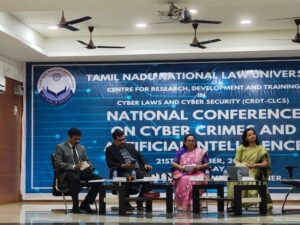
The panel acknowledged that technology is evolving at a rapid pace, leading to newer and more complex forms of cybercrimes. While the core nature of crime remains the same, the medium through which these crimes are perpetrated has changed drastically. Cybercrime is no longer limited to traditional offenses but now includes modern threats like hacking, phishing, ransomware, and deepfake technology. This rapid evolution of the cyber landscape poses unique challenges to law enforcement and regulators.
The panelists emphasized that despite the growing prevalence of cybercrimes, there is still no universally accepted legal definition of “cybercrime.” Various efforts have been made to harmonize cyber laws across jurisdictions, yet significant gaps remain, particularly in addressing cyber-dependent crimes (such as hacking) and cyber-enabled crimes (such as online drug trafficking). The panel called for an extension of crime definitions in law to better address these emerging challenges.
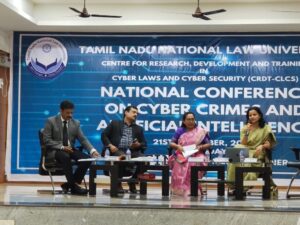
The mindset of cybercriminals is evolving. Hackers today are more patient, organized, and professional in their approach. Technologies like AI and the dark web provide them with sophisticated tools to carry out their activities. The emergence of issues like deepfake technology and the growing instances of cybercrimes related to child pornography are also alarming trends that were discussed in detail.
A significant portion of the discussion centered on the gaps in India’s legal framework for addressing cybercrimes. The Information Technology (IT) Act, which serves as the backbone for cyber regulations in India, touches upon cybercrimes but with limited scope. The panelists stressed that there is a need for comprehensive legal reform to address issues like dispute resolution in cybercrime cases, as well as the enforcement of rights in the digital space.
It was pointed out that, from an academic standpoint, some key aspects are missing in the IT Act, particularly concerning cybercrime regulation. It was highlighted that laws must constantly evolve to keep pace with new threats, and whenever a new cybercrime occurs, lawmakers must assess whether the existing legal framework is adequate.
Comparing India’s response to cyber threats with that of European nations, the panelists noted that while European legislation is moving at a faster pace in addressing cybercrime, gaps remain there as well. For example, while they lead in data protection regulations like the General Data Protection Regulation (GDPR), the cybercrime domain still faces its own set of challenges. India, however, lags in passing similar comprehensive laws, and this gap needs to be addressed quickly.
The panel also discussed the role of the judiciary in interpreting cyber laws and the responsibility of academics and lawyers in guiding future legislation. Judges are increasingly encountering complex technological issues in their courtrooms, and a deep understanding of the technological landscape is essential for delivering just decisions. Additionally, the interpretation of statutes plays a crucial role, particularly in a fast-changing area like cyber law.
A key focus of the discussion was finding a balance between ensuring security in cyberspace and protecting individual rights, especially privacy. In an interconnected digital world, cybersecurity and data privacy are often at odds with each other. The panel raised concerns about the rights of children, especially with the rise of content featuring children, and how this could lead to exploitation and financial gain at the expense of their privacy and rights.
Another point raised was the issue of digital inequality. While India boasts incredible technological penetration, with internet access becoming more affordable and widespread through initiatives like UPI, a digital divide persists, particularly in marginalized communities. The panel discussed how this inequality can impact access to essential services and create challenges for public welfare systems that increasingly rely on technology.
The discussion also covered how Artificial Intelligence (AI) is rapidly advancing and how its use, particularly in law enforcement, raises ethical concerns. The panel questioned the type of training data that is being fed into AI systems and whether this is perpetuating biases or creating new forms of inequality. Technology, if not used responsibly, can easily circulate misinformation and exacerbate existing societal issues.
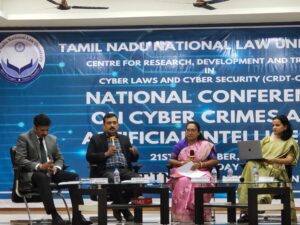
Finally, the panel emphasized the importance of an interdisciplinary approach when studying and practicing law in the digital age. Cyber law must not be viewed in isolation but in conjunction with other areas such as political science, economics, and sociology. Laws reflect the values of society, and as technology continues to evolve, the interpretation and application of the law will also have to adapt accordingly.
In conclusion, the panel stressed the need for multi-stakeholder participation—including legislators, the judiciary, academics, and legal professionals—in shaping a robust legal framework that addresses the threats posed by cybercrimes and AI. The overarching message was that while technology offers immense benefits, it is essential to stay vigilant about its potential misuse, and proactive legal measures must be taken to combat these threats while safeguarding fundamental rights.
12:15 PM | Technical Sessions- Schedule Parallel Session-I & II| PG Block
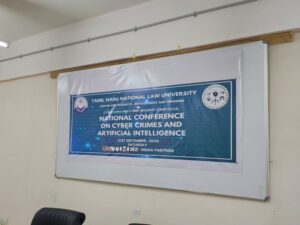
The online and offline presentations commenced with a thematic session addressing a wide range of emerging cybercrimes, including those in the metaverse, extended reality (XR), artificial intelligence (AI), and robotics. In the conference halls, presenters shared their research, focusing on pivotal issues such as property rights in the metaverse and whether existing property laws can be applied to virtual environments like the metaverse. The concept of digital property was also explored, along with the implications of brain-computer interfaces, and the rise in “sextortion” crimes. Humanoid sex bots, such as Roxxxy, were discussed, highlighting both the potential benefits and risks, especially given the inadequate coverage of these issues in the current Information Technology (IT) Act.
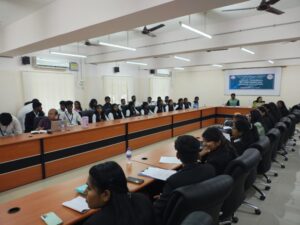
The conversation further expanded to the “right to access the internet” and the growing importance of cyber insurance in the metaverse, aimed at protecting virtual assets. Theoretical discussions, such as the “theory of self-perception,” delved into the psychological effects of engaging with digital assets, exposing the darker side of the digital economy. One of the key topics was the impact of gaming on children and how it influences their psychology. There was a growing concern about child privacy legislation in India, particularly regarding the need for new regulations that better protect children in an increasingly digital world. The presenters also highlighted the blurring of lines between physical and virtual realities, emphasizing the psychological and physical effects of virtual reality (VR) on users, especially children.
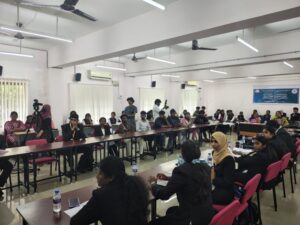
Panelists provided insightful suggestions on how presenters could improve their papers, emphasizing the importance of a sound research methodology, a strong degree of originality, and a comprehensive approach to addressing issues such as cyber warfare and terrorism in a digital India. They recommended greater involvement of policymakers, regulators, and academics, to ensure a holistic approach to solving these complex issues. The session concluded with Ms. Vedavalli, Assistant Professor of Law offering a Vote of Thanks, expressing gratitude to all presenters and attendees for their contributions to the discussions.
2:30 PM | Technical Sessions- Schedule Parallel Session-III| PG Block
In this technical session, the theme centered around cybercrimes, cybersecurity challenges, and the role of law enforcement agencies in tackling cyber crimes in the age of artificial intelligence (AI). Several critical areas were explored, starting with a comparative analysis of the legal frameworks and institutional measures to prevent cybercrime across India, the European Union, and the United States. The session delved into thought-provoking topics such as a Systematic Review of Cyber Forensics on Quantum Cryptography Communication System Cracking and the vulnerabilities in smart technology, notably highlighted by the presentation titled, “Alexa, Let the Burglars In Exposing the Unholy Alliance Between Smart Tech and Savvy Criminals.” This discussion provided a comprehensive dissection of the vulnerabilities in the Internet of Things (IoT) and the ongoing battle for digital domestic sovereignty.
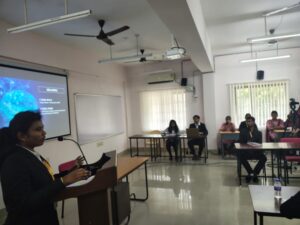
Another key focus of the session was the concept of digital evidence. The presenters referred to the definition of digital evidence as provided by the European Council and elaborated on the various sources of such evidence, including the internet, mobile phones, networks, and more. The discussion emphasized how digital evidence is translated into a human-understandable form, and traced the evolution of digital evidence in India.
One of the presenters emphasized the urgent need to build robust infrastructure in India to address the rapidly evolving challenges in law enforcement mechanisms, particularly the use of digital evidence and cybersecurity threats. There was also a notable discussion on the difference between “an expert” and “the expert” in the context of digital forensics, a topic that was raised by the panelists during the interactive segment. The session offered deep insights into the legal, technological, and forensic challenges posed by cybercrimes and the evolving role of law enforcement agencies in the digital age.
The session concluded with Dr. Peerzada Shah Faisal, Assistant Professor of Economics offering a Vote of Thanks, expressing gratitude to all presenters and attendees for their contributions to the discussions.
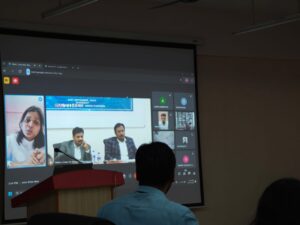
4:30 AM | Panel Discussion-II| Multi-Purpose Hall
Theme: Data Privacy and Cyber Threats in the Age of AI vs. Cybersecurity
Moderator: Mr. Na. Vijayashankar (Naavi), Chairman of the Foundation of Data Protection Professionals in India (FDPPI) and Founder Director of Cyber Law College
Panelists: Dr. Ashok P. Wadje, Associate Professor of Law at MNLU-Aurangabad, Advocate Karthikeyan, an Information Technology law practitioner, and Dr. Ranjit Oommen Abraham, Head of the Department of Cyber Space Law & Justice at Tamil Nadu Dr. Ambedkar Law University, Chennai.
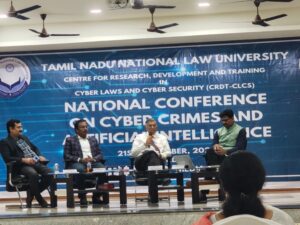
The discussion primarily revolved around data protection, compliance, and privacy concerns in the age of AI and increasing cybersecurity threats. The conversation highlighted that compliance is an ongoing process, and organizations should not delay becoming compliant while waiting for perfect conditions. Understanding the legislative intent behind laws such as the Data Protection Act (DPDA) 2023 and its draft rules is essential to stay on the right side of compliance. The panel emphasized the significance of the Puttaswamy judgment, which was a landmark decision that established the right to privacy as a fundamental right in India. There were questions raised about whether the DPDA 2023 adequately safeguards privacy, with concerns about whether it disregards the intent and implications of the Puttaswamy judgment.
The Information Technology Act, particularly Section 43A, and the Sensitive Personal Data or Information (SPDI) Rules were also discussed in the context of the protection of sensitive information. These laws have long been in place to provide a framework for data security, recognizing sensitive personal data. The concept of a data fiduciary, a person or entity responsible for determining the purpose and means of processing data, was highlighted as globally important. The panelists discussed the need for data fiduciaries to acknowledge and respect the sensitivity of the data they handle, especially as industries expand their use of personal data.
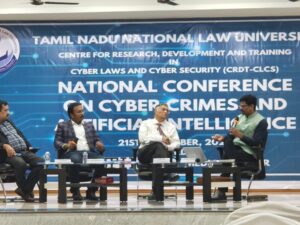
A key point of debate was the evolving nature of data privacy laws and how the DPDA 2023 reflects a different perspective from the Puttaswamy judgment. While the judgment focused on privacy as a broad, fundamental right, the DPDA primarily deals with data protection and the processing of personal data. The panelists noted that privacy, as a concept, is challenging to define, and the act could potentially reduce the scope of privacy rights by turning them into legal rights under data protection legislation. The panel also touched upon the OECD Report on Data Privacy, which emphasizes modern rights regarding data protection, highlighting that privacy is only one aspect of a broader issue.
Interestingly, the word “privacy” is not mentioned in the DPDA 2023. However, the act reflects various rights granted to data principals, such as the right to nomination, which allows individuals to nominate a person to manage their data in case of their incapacity. The discussion also delved into the idea of data as an asset and the need to protect its value. The concept of internet data theft was discussed, with questions raised about the offenses and the nature of the crimes involved in such cases.
The panelists emphasized that data fiduciaries have significant responsibilities to protect personal data, with obligations to establish legal grounds for data processing, provide notice and obtain consent, and ensure data security. There was a call for greater focus on digital signatures and consent artifacts, which need to be robustly secured in digital environments.
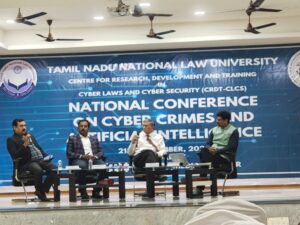
Educational institutions, healthcare providers, and other organizations that handle vast amounts of personal data were also discussed, with a strong recommendation for regular data audits to ensure compliance and security. It was pointed out that the DPDPA 2023 does not provide compensation to data principals in the event of data breaches, raising concerns about the limited protection offered to individuals. Additionally, data processors—entities that process data on behalf of data fiduciaries—are not adequately covered by the act, leaving gaps in accountability.
The session concluded by urging participants to focus less on procedural hurdles and more on finding effective solutions to protect individuals’ data in the evolving digital landscape. The panel expressed hope that the final rules under the DPDA would address these concerns and strike a balance between individual rights and the interests of businesses and data controllers.
5:30 AM | Valedictory Ceremony| Multi-Purpose Hall
The welcome address was delivered by Dr. Peerzada Shah Faisal, Assistant Professor of Economics, setting the stage for the conference. Following this, a felicitation ceremony was held in honor of the Chief Guest, Hon’ble Thiru Justice G.R. Swaminathan, Judge of the Madras High Court, recognizing his presence and contributions to the legal community.
After the felicitation, Ms. Deepika Sivakumar, Assistant Professor of Law, presented a comprehensive Report on the Conference Sessions and Panel Discussion. She provided insights into the various research papers presented during the conference, highlighting the broad range of topics and key areas of cyber law and technology that were addressed. The papers dealt with cutting-edge issues such as data privacy, cybercrime, artificial intelligence, and digital evidence, reflecting the rapidly evolving intersection of law and digital innovation.
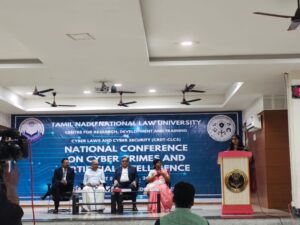
In the valedictory address, Hon’ble Justice G.R. Swaminathan emphasized the profound impact of the confluence of data on the legal profession, remarking on the vast changes it has brought about. He stressed the importance of precision lawyering, urging legal professionals to master their respective fields with meticulous attention to detail. Justice Swaminathan’s message to the participants was that while AI can serve as a powerful tool and assistant in legal practice, lawyers need to retain control and command over their subject matter.
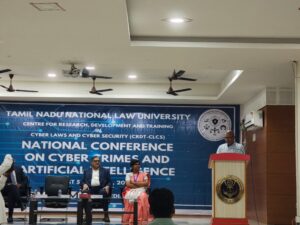
He commended the participants on the success of the conference, remarking on the enriching experience it provided for everyone involved. His closing remarks were filled with encouragement and congratulations, leaving the audience with valuable takeaways for their future legal endeavors.
5:50 AM | Award Ceremony| Multi-Purpose Hall
Following is the list of winners from each of the five themes of the Conference.
Theme 1: Cyber Crimes in Metaverse
Gokul S and Pawan SS from School of Law, Christ (Deemed to be University), Bangalore
Paper Title: Cyber insurance in metaverse: Protecting Virtual assets against emerging cybercrimes in legal challenges
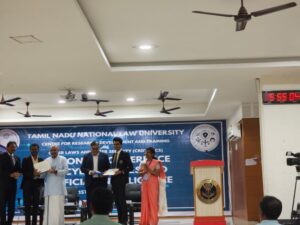
Theme 2: Cyber Crimes in Extended Reality
Varsha M and Swerna Raksha from the School of Excellence in Law, Chennai
Paper Title: Extended Reality: The impact of cyber kids in gaming and online world
Theme 3: Cyber Crimes Related to AI and Robotics
Jothika VS from the School of Excellence in Law, Chennai
Paper Title: Deepfake Technology: Legal Implications and the Battle Against Misinformation
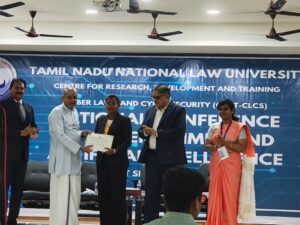
Theme 4: Cyber Crimes and Cyber Security Challenges
Anaka Angeline(Online) from National Law School of India University
Paper Title: Leveraging AI to negotiate fairer consumer contract terms
Theme 5: Law Enforcement Agencies and Cyber Crimes in the Age of AI
Meera Patel(online) from the School of Law and Constitutional Studies, Shobhit Institute of Engineering & Technology
Paper Title: Legal Identity of Artificial Intelligence under Indian Law
A vote of thanks was given by Ms. Deepa Manickam, Director of the Conference, and with this, the Conference was concluded successfully.



